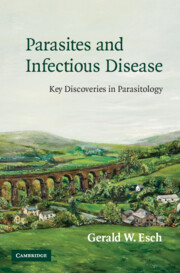Book contents
- Frontmatter
- Contents
- Preface
- Prologue
- 1 African trypanosomes and their VSGs
- 2 Malaria: the real killer
- 3 The HIV–AIDS vaccine and the disadvantage of natural selection: the yellow fever vaccine and the advantage of artificial selection
- 4 Lyme disease: a classic emerging disease
- 5 The discovery of ivermectin: a ‘crapshoot’, or not?
- 6 “You came a long way to see a tree”
- 7 Infectious disease and modern epidemiology
- 8 The ‘unholy trinity’ and the geohelminths: an intractable problem?
- 9 Hookworm disease: insidious, stealthily treacherous
- 10 The spadefoot toad and Pseudodiplorchis americanus: an amazing story of two very aquatic species in a very dry land
- 11 The schistosomes: split-bodied flukes
- 12 Dicrocoelium dendriticum and Halipegus occidualis: their life cycles and a genius at work
- 13 Trichinosis and Trichinella spp. (all eight of them, or is it nine?)
- 14 Phylogenetics: a contentious discipline
- 15 Toxoplasma gondii, Sarcocystis neurona, and Neospora caninum: the worst of the coccidians?
- Summary
- Index
- References
7 - Infectious disease and modern epidemiology
Published online by Cambridge University Press: 24 November 2009
- Frontmatter
- Contents
- Preface
- Prologue
- 1 African trypanosomes and their VSGs
- 2 Malaria: the real killer
- 3 The HIV–AIDS vaccine and the disadvantage of natural selection: the yellow fever vaccine and the advantage of artificial selection
- 4 Lyme disease: a classic emerging disease
- 5 The discovery of ivermectin: a ‘crapshoot’, or not?
- 6 “You came a long way to see a tree”
- 7 Infectious disease and modern epidemiology
- 8 The ‘unholy trinity’ and the geohelminths: an intractable problem?
- 9 Hookworm disease: insidious, stealthily treacherous
- 10 The spadefoot toad and Pseudodiplorchis americanus: an amazing story of two very aquatic species in a very dry land
- 11 The schistosomes: split-bodied flukes
- 12 Dicrocoelium dendriticum and Halipegus occidualis: their life cycles and a genius at work
- 13 Trichinosis and Trichinella spp. (all eight of them, or is it nine?)
- 14 Phylogenetics: a contentious discipline
- 15 Toxoplasma gondii, Sarcocystis neurona, and Neospora caninum: the worst of the coccidians?
- Summary
- Index
- References
Summary
Life is as tedious as a twice-told tale, Vexing the dull ear of a drowsy man;
King John, William Shakespeare (1564–1616)Ross, Bailey, Hairston, Bradley, Michel, McDonald, are all names that will be recognized immediately by any epidemiologist/modeler working on eukaryotic parasites. Almost all of these people studied and published prior to 1971, beginning with Sir Ronald Ross who, I am sorry to say, rather feebly attempted to predict the prevalence of malaria in mathematical terms. Most investigators in this area would agree that the seminal publications for the modern epidemiology of helminth parasites were those of Crofton (1971a, b). His efforts were truly the ‘seeds’ for what followed. Harry Crofton, most unfortunately, died very young, not long in fact after publishing his two papers in 1971. I have often wondered what would have followed had he lived a longer life.
Early in my career, I had the pleasure of spending almost an entire year (1971–72) at Imperial College in London with Desmond Smyth, who was trying to teach me the intricacies of in vitro culture. He succeeded, but in doing so, I also learned that this sort of research is tedious, very expensive, and, frankly (for me, at least), terribly boring. It was about that time that I turned my complete attention to ecological pursuits.
- Type
- Chapter
- Information
- Parasites and Infectious DiseaseDiscovery by Serendipity and Otherwise, pp. 203 - 218Publisher: Cambridge University PressPrint publication year: 2007



